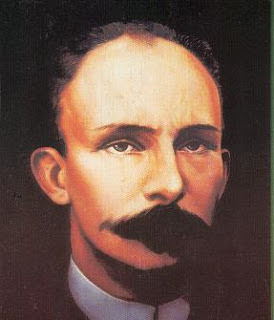"There is no forgiveness for acts of hatred. Daggers thrust in the name of liberty are thrust into liberty's heart." - José Martí
 |
| José Julián Martí Pérez: January 28, 1853 - May 19, 1895 |
José Julián Martí Pérez was killed 127 years ago today in battle against Spanish troops at the Battle of Dos Ríos, near the confluence of the rivers Contramaestre and Cauto, on May 19, 1895. He is buried in the Santa Efigenia Cemetery in Santiago de Cuba. Cubans the world over honor his memory and Cuban independence follows a day later. Seven years and one day after Martí's death Cuba formally obtained its independence on May 20, 1902. Dr. Suchlicki in his essay "THE DEATH OF A HERO" describes him as Cuba’s greatest hero and most influential writer.
 |
| Maykel Castillo Pérez Osorbo |
Yesterday, a modern José Martí, marked one year in prison. Maykel Castillo Pérez Osorbo is an artist, husband, father, and an Amnesty International prisoner of conscience who has spent one year in prison for exercising his fundamental rights. He is a rap artist, like Martí a poet, a defender of human rights, and imprisoned for his defense of Cuban sovereignty residing among the Cuban people.
The Castro regime jails minors for expressing themselves, in an action reminiscent of the Spanish colonial government's targeting of the future Cuban independence leader when he was a child. On October 21, 1869, when he was just 16 years old, José Martí was jailed,and accused of sedition for a letter he wrote criticizing
a friend for joining the Spanish army.
Cubans across the ideological divide claim José Martí as their own. The claims of the dictatorship, led by the Castro family, that Martí is the intellectual author of their political project is ironic considering that the life and writings of this Cuban journalist, poet, and independence leader are the antithesis of the Castro regime.
 |
| Killed 127 years ago today riding into battle on horseback. |
It is doubly ironic because both Francisco Franco's father and Fidel and Raul Castro's father had been soldiers who fought in Cuba to preserve its colonial status within the Spanish empire. Castro's father, Angel, according to the 2016 documentary, "Franco and Fidel: A Strange Friendship", had a photo of Franco on his nightstand. This historical link translated into a "special relationship" between the two dictators and is available online.
Both José Julián Martí Pérez's writings and actions taken by him in life point to a man who prized liberty, independence based in popular sovereignty, and freedom of speech, thought and association as fundamental to his sense of being. He was a prisoner of conscience, before Amnesty International coined the term, jailed for writing a disapproving letter to a classmate who joined the Spanish army.
Under the Castro regime freedom of expression can end in prison for engaging in "enemy propaganda," and freedom of thought can also lead you to prison for the crime of "dangerousness." This is an affront to José Marti's belief that "liberty is the right of every man to be honest, to think and to speak without hypocrisy." Hypocrisy, under the Castro regime, is a currency for survival.
 |
| Oswaldo Payá Sardiñas |
Cuba under the Castros is not the vision advanced by Cuba's greatest hero. This tradition of freedom and respect for freedom of thought and speech existed during the Republic (1902 - 1952) and still exists today, underground, among dissidents in the island, and on more than one occasion cost the lives of other heroes to defend. One of Marti's modern day counterparts is Oswaldo Payá Sardiñas, who addressed the European Parliament on December 17, 2002:
"The first victory we can claim is that our hearts are free of hatred. Hence we say to those who persecute us and who try to dominate us: ‘You are my brother. I do not hate you, but you are not going to dominate me by fear. I do not wish to impose my truth, nor do I wish you to impose yours on me. We are going to seek the truth together.’"
Oswaldo was extra-judicially executed by the secret police on July 22, 2012. Other modern counterparts can also be found in the 27N and San Isidro movements, and the artists, journalists and intellectuals that nonviolently gathered in front of the Ministry of Culture to read the works of José Martí on January 27, 2021, and were beaten up by the Castro dictatorship's Minister of Culture, and arrested by the regime's political police.
The Cuban dictatorship has managed to exceed the Spanish colonial authority by jailing a parent for speaking up for their imprisoned child. Rowland Jesús Castillo Castro, jailed at age 17 for nonviolently protesting during the 11J protests, is serving an unjust 18 year prison sentence. His father, Rolando Castillo, was subjected on May 18, 2022 to an "express trial" without an attorney and sentenced to two years in prison, with less than two hours notice.
 |
| Father and Son: Rowland Jesús Castillo Castro and his father Rolando Castillo |
The legacy of José Martí in Cuba today is found among the persecuted dissidents defending free speech, freedom of association and demanding a free and independent Cuba. Although the Castro regime uses the name and image of the Cuban journalist and poet they have done everything to pervert and destroy his true message of liberation.
"I think they kill my child every time they deprive a person of their right to think." - José Martí
 |
| Burial site of José Martí |





No comments:
Post a Comment